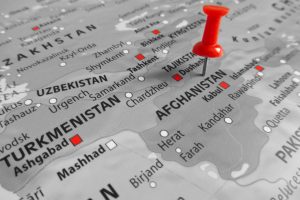On July 18, Afghanistan, Pakistan, and Uzbekistan signed an agreement on a tripartite trans-Afghan railway project connecting the three countries. The line will connect Pakistan’s Kurram border crossing Kharlachi with Termez in southern Uzbekistan. The project is expected to be completed by the end of 2027, and by 2030 trains may be able to transport up to 15 million tons of cargo annually.
The idea of a railroad running from Uzbekistan deep into Afghanistan has been on the agenda for the past six years. In December 2017, Uzbek President Shavkat Mirziyoyev signed an agreement on the project with his Afghan counterpart, Ashraf Ghani. There was an attempt to revive the agreement in a broader form in 2018 by the heads of the state railway companies of Afghanistan, Kazakhstan, Pakistan, Russia, and Uzbekistan. In December that year, they met in Tashkent to discuss plans to build a Mazar-i-Sharif-Kabul-Peshawar railway line. The project was, however, delayed and eventually scrapped, for a variety of reasons including the Taliban takeover of power in 2021. On July 19, Mirziyoyev addressed the first Gulf Cooperation Council-Central Asia Summit in Riyadh and asked the GCC member states to participate in the railway project, advertising it as connecting the Gulf countries to Central Asia.
The revival of the trans-Afghan railway project and the Uzbek president eliciting support for it may not necessarily lead to its fruition. Moscow is no longer interested and neither is Kazakhstan. However, what is important to note here is Uzbekistan’s determination to make it a success. On a broader plane, it represents a season for engaging the Taliban, which Tashkent has been willing to revel in. For a country that supported the Northern Alliance in the 1990s against the Taliban, this has been a dramatic overhaul of state policy.
Contrast that with the following incident. So much was the trust between Tashkent and the Afghan administration that immediately after the Taliban takeover, Afghan air force pilots and personnel left the country on planes to third countries. Twenty-two military aircraft and 24 helicopters flew to Uzbekistan. Tashkent refused to return them to the Taliban, saying that the aircraft belonged to the United States.
The break with the past, however, came within a month of the Taliban taking over power in Kabul. On September 20, 2021, Ismatulla Irgashev, Uzbek president’s special representative on Afghanistan, talked of road and railway connections with Afghanistan to ship “food and medical supplies.”
On February 22, 2022, Uzbekistan’s Deputy Prime Minister Sardor Umurzakov, who also heads the Investments and Foreign Trade Ministry, flew to Kabul to meet with the Taliban leadership. The following May, Uzbekistan outlined its Afghan policy describing itself as a “key interlocutor that has accepted the reality in Kabul.” In a media interview, Irgashev said that they have long-established “solid contacts” with the Taliban with whom they “talk regularly and discuss cooperation.” He, however, maintained that Uzbekistan would not formally recognize the Taliban until the international community does so. The attempt was to play a fine balancing game in its relations with the West while exploring economic and trade opportunities with the Taliban-controlled Afghanistan.
But the tilt toward doing business with the Taliban was obvious.
On July 26-27, 2022, Uzbekistan convened an international conference on Afghanistan. More than 100 delegations from nearly 30 countries, including a Taliban delegation, attended the event in Tashkent. Taliban Acting Foreign Minister Amir Khan Muttaqi told the conference that Afghanistan was open for business. He had sensed that many of the participants, especially those from Central Asia, were clearly pushing toward an eventual normalization of relations with the Islamic Emirate. On the second day of the conference, Muttaqi visited the Afghan embassy in Tashkent and expressed his satisfaction with the work of the diplomats, thereby indirectly confirming that the embassy’s affairs have indeed changed hands.
While recognizing the Taliban remains only a formality yet to be completed, Tashkent has gone ahead with officially dealing with the Taliban on multiple fronts. On July 11 this year, Irgashev met with Mohammad Yusuf Wafa, the governor of Afghanistan’s Balkh province, discussing trade between the two countries. This year, Irgashev has been on a diplomatic overdrive meeting the Turkish ambassador to Uzbekistan (on June 16), the Ambassador of the EU and the UNDP Resident Representative in Uzbekistan (on May 23), and the Iranian ambassador to Uzbekistan (on July 3) apparently trying to evolve a consensus-based “engage with the Taliban” policy.
In return, the Taliban, hungry for international recognition and legitimacy, seem to be trying to fulfill some of Uzbekistan’s demands. In August 2022, the Islamic State-Khorasan Province (ISKP) launched rocket attacks on Uzbekistan from Afghan soil. On July 8 this year, a Taliban Ministry of Border and Tribal Affairs delegation traveled to Uzbekistan to assure their counterparts that they will not allow insurgent groups to use Afghan soil against Uzbekistan.
In spite of its continuing repressive policies and an extremely poor human rights record, a growing number of countries are discovering utility in engaging the Taliban’s Islamic Emirate. Uzbekistan’s policies are reflective of that trend. It is probably pragmatic on its part to explore business and trade opportunities with the de facto powers in neighboring Kabul. However, whether it will use its growing influence to even attempt establishing an inclusive government in Afghanistan or turn a blind eye to its own declared objective remains to be seen.
































